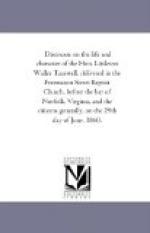In the fall of 1803, William Wirt, whose brilliant genius has reflected so much credit on his adopted Commonwealth, came to reside in Norfolk. Like all his legal compatriots, he had been an active politician, and had been clerk of the House of Delegates for three sessions, during the last of which, the session of 1799, the Virginia report was adopted, and was a warm personal and political friend of Mr. Jefferson. It is from his pen that the beautiful resolutions of the Virginia Assembly, approving the administration of Jefferson at its close, proceeded; but then he was not known even as the author of the Letters of the British Spy which, though they had been printed in the Richmond Argus in the early fall, had not been collected into a volume. He was welcomed most cordially by Mr. Tazewell, by whose persuasion he had come to Norfolk, and whose business was now so overflowing that he offered, as we are told by Wirt, to withdraw from several courts purely for his benefit. The success of Wirt was flattering, but, overcome by the fear of the yellow fever, and seduced by family attachments, in the early summer of 1806, he removed to Richmond. While he resided in Norfolk, he was engaged with Mr. Tazewell in the case of Shannon (1804), which was tried in Williamsburg, and which excited the most intense interest in Eastern Virginia. Of Mr. Tazewell’s speech on the trial Mr. Wirt always spoke in terms of enthusiastic admiration, which was not the less glowing as until that time he had looked upon Mr. Tazewell only as a severe logician, and incapable of the loftier flights of eloquence. The buoyancy of Wirt’s spirits is exhibited in his admirable letters published in the memoir of Mr. Kennedy; and his gentle courtesy




